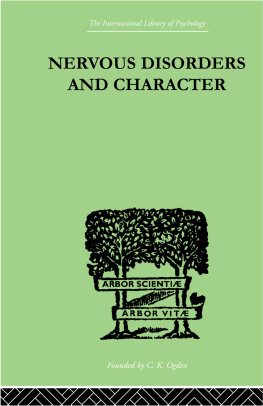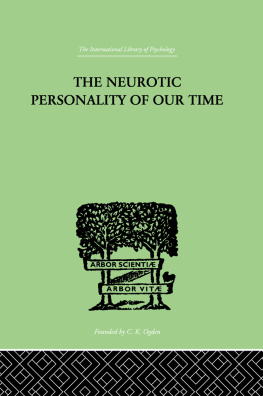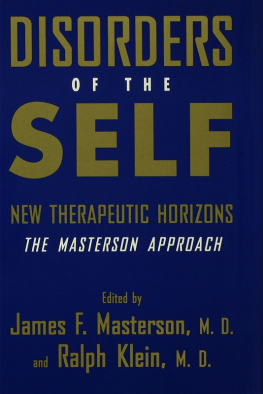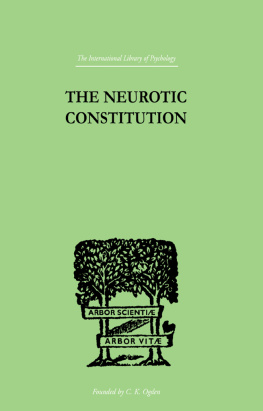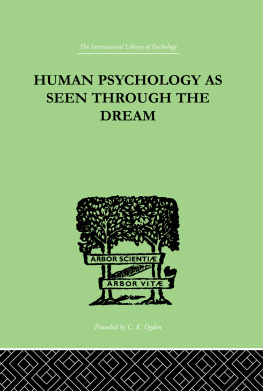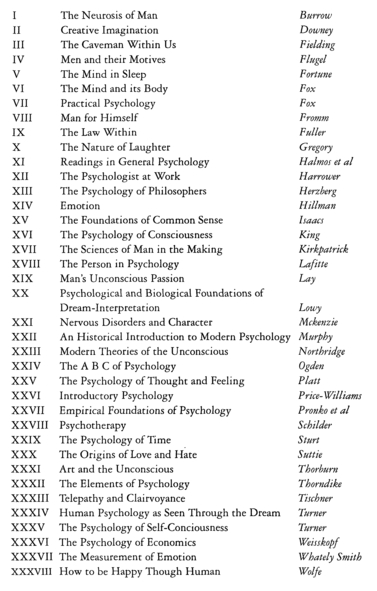The International Library of Psychology
NERVOUS DISORDERS AND CHARACTER
Founded by C. K. Ogden
The International Library of Psychology
GENERAL PSYCHOLOGY
In 38 Volumes
Nervous Disorders and Character
A Study in Pastoral Psychology and Psychotherapy
John G McKenzie
First published in 1946 by
Routledge and Kegan Paul Ltd
Reprinted in 1999 by
Routledge
2 Park Square, Milton Park, Abingdon, Oxon, OX14 4RN
Transferred to Digital Printing 2006
Routledge is an imprint of the Taylor & Francis Group
1946 John G McKenzie
All rights reserved. No part of this book may be reprinted or reproduced or utilized in any form or by any electronic, mechanical, or other means, now known or hereafter invented, including photocopying and recording, or in any information storage or retrieval system, without permission in writing from the publishers.
The publishers have made every effort to contact authors/copy right holders of the works reprinted in the International Library of Psychology.
This has not been possible in every case, however, and we would welcome correspondence from those individuals/companies we have been unable to trace.
These reprints are taken from original copies of each book. In many cases the condition of these originals is not perfect. The publisher has gone to great lengths to ensure the quality of these reprints, but wishes to point out that certain characteristics of the original copies will, of necessity, be apparent in reprints thereof.
British Library Cataloguing in Publication Data
A CIP catalogue record for this book
is available from the British Library
Nervous Disorders and Character
ISBN 978-0415-21033-1
General Psychology: 38 Volumes
ISBN 0415-21129-8
The International Library of Psychology: 204 Volumes
ISBN 0415-19132-7
Printed and bound by CPI Antony Rowe, Eastbourne
MY first word must be one of thanks to the Principal and Governors of Manchester College, Oxford, for the honour and opportunity of delivering the series of Tate Lectures which constitute the substance of this small volume. The hospitality, so charmingly dispensed by the Principal's wife, Mrs. Cross, is a happy memory which I share with many officers of the army whose duties took them to Oxford in wartime. Nor shall I soon forget the thoughtful kindnesses of the Principal, the keen discussions of the students in the Common Room in the evenings, all of which added to the enjoyment of my visits. I was greatly privileged to take the services in the College Chapel and to preside at the Sacrament of the Lord's Supper.
The Lectures themselves are almost as delivered except for an enlargement here and there, and for the omission of some illustrations which, although they would have added to the value of the volume, could not be inserted because the subject of the illustration might have been recognized. They embody some of the conclusions I have reached in regard to the relation between Nervous Disorders and Character-structure. In another series, to be delivered in r947 in Manchester College, I hope to deal specifically with the Religious Factor in these disorders. In addition to showing the personality-factor in nervous troubles I have out lined what I think is the sphere of Pastoral Psychology in relation to Psychotherapy and Psychopathology. In the final lecture there will be found the situation which gives rise to the symptoms, hints about mental hygiene, a characterization of the mature adult, and a word as to what the pastor can do. I have also, in the third lecture, described various mental processes such as the "unconscious motive", repression and rationalization which are still imperfectly understood even by distinguished writers in philosophy and religion.
In thirty years' study of the neuroses, and twenty-five years of personal dealing with the victims of neurotic conflict, one's attitude changes as deeper insight into the character of both the conflicts and their causes develops. I believe, in contrast to Freud and the Psycho-analytical school, that not the " external factor " in the causation of neurotic conflict is the most important, but the internal factor, namely, the individual's moral and religious character. And I believe also that a change in the latter alone can constitute a " cure ".
As far as I know, I have given references to the authors quoted. That, however, is not the extent of my indebted ness to others. I am debtor to all schools of psychology, but I am more indebted to my patients. I would specially make mention of the writings of Erich Fromm and Karen Horney. They have helped me to crystallize trends of thought of which I have been conscious for some years. I believe their approach from the side of personality instead of from the side of "repressed complexes" is the way to real progress in psychology and psychotherapy. There is need for a deeper study of the personality as a whole, as a dynamic unity, from the psychological point of view.
Many people have been disappointed at not being able to purchase a copy of my Souls in the Making. It has been for some time out of print. It needs to be re-written through out to fulfil the purpose of a true Introduction to Pastoral Psychology. I hope, however, that this small volume will meet the need for such an introduction to a subject of increasing importance to all who have to deal with the personal problems of our time.
My thanks are due to Rev. H. Newsham, M.A., Edinburgh, for the careful reading of the MS. in type, and the suggestions he made. To my daughter, Dr. Margaret R. Laws, M.A., and her husband, Dr. F. Laws, I am grateful for their careful correction of the proofs.
Paton College,
Nottingham, 1946.
Contents
LECTURE 1
Character-Structure and Personality-Disorders |
LECTURE 2
Psychology, Psychotherapy and Pastoral Psychology |
LECTURE 3
Mental Mechanisms |
LECTURE 4
The Nature, Origin and Resolution of Conflicts |
Lecture 1
Character-Structure and Personality-Disorders
THE passing of the Education Bill is not the only sign of a growing consciousness that the curricula of Educational Bodies must be overhauled if we are to meet the complicated problems of both society and the individual in the post-war years. The Royal College of Physicians has issued its report on the training of medical students; and one of the points it emphasizes in its recommendations is that there must be given to every prospective doctor a more rational education in psychological medicine. Not only should the medical practitioner be able to diagnose organic disease, but he must be able to recognize and treat if possible, or refer to the specialist, disorders whose causative factors lie in the mind and character of the patient.
It is a common-place that an individual may be sound in every organ of his body and yet manifest physical symptoms of a distressing kind, such as heart disturbance, disorders of the alimentary canal, functional paralysis, debilitating head aches, excessive fatigue. Indeed, there seems to be few organic diseases which the neurotic individual cannot unconsciously simulate. On the other hand, there may be no sign of physical symptoms, but the patient may complain of disturbed sleep in which he wakens full of anxiety, apprehensiveness, and covered with perspiration; or he confesses to irrational fears which make his life a torture: the fear of closed places; of going out alone; of crossing the street; of going insane; of violent feelings accompanied by the fear of doing bodily harm to someone; a fear of suffering from some particular disease such as syphilis or cancer. These are but a few of the fears of which patients complain; and which, through a more rational education in psychological medicine, the practitioner will at least understand even if he cannot undertake treatment himself.

